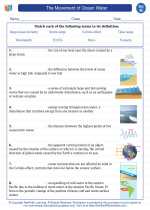Earthquakes
An earthquake is the shaking of the surface of the Earth resulting from a sudden release of energy in the Earth's lithosphere that creates seismic waves. This can happen when there is a sudden movement along a fault line or when there is volcanic activity.
Causes of Earthquakes
Earthquakes can be caused by a variety of factors, including:
- Tectonic Plate Movement: The majority of earthquakes occur along the boundaries of tectonic plates. When these plates move, they can cause stress to build up in the Earth's crust, which can lead to an earthquake.
- Volcanic Activity: Earthquakes can also be caused by volcanic activity when magma moves beneath the Earth's surface, putting pressure on the surrounding rocks and causing them to fracture.
- Human Activities: Some earthquakes can be triggered by human activities such as mining, reservoir-induced seismicity (caused by the filling of large reservoirs), and hydraulic fracturing.
Measuring Earthquakes
Earthquakes are measured using instruments called seismographs. The magnitude of an earthquake is measured on the Richter scale, which is a logarithmic scale that measures the amplitude of seismic waves. The intensity of an earthquake, on the other hand, is measured using the Modified Mercalli Intensity (MMI) scale, which assesses the effects of an earthquake on the Earth's surface and on humans, buildings, and natural features.
Effects of Earthquakes
Earthquakes can have a wide range of effects, including:
- Ground Shaking: The most immediate and noticeable effect of an earthquake is the shaking of the ground, which can cause buildings and infrastructure to collapse.
- Landslides and Tsunamis: Earthquakes can trigger landslides in hilly or mountainous areas, and in coastal regions, they can generate tsunamis, which are large ocean waves that can cause widespread destruction.
- Structural Damage: Buildings, bridges, and other structures can suffer severe damage or collapse during an earthquake, leading to loss of life and property.
- Aftershocks: After the main earthquake, smaller tremors known as aftershocks can occur, which may cause additional damage to already weakened structures.
Studying for Earthquakes
To study for a topic like earthquakes, it's important to understand the causes, effects, and measurements associated with seismic activity. Here are some key points to focus on:
- Understand the different causes of earthquakes, including tectonic plate movement, volcanic activity, and human-induced factors.
- Be familiar with the instruments and scales used to measure earthquakes, such as seismographs, the Richter scale, and the Modified Mercalli Intensity scale.
- Learn about the effects of earthquakes, including ground shaking, landslides, tsunamis, and structural damage.
- Study how scientists monitor and predict earthquakes, and the ways in which communities can prepare for and respond to seismic events.
By understanding these key concepts, you can gain a deeper knowledge of earthquakes and their impact on the Earth's surface and society.
[Earthquakes] Related Worksheets and Study Guides:
.◂Science Worksheets and Study Guides Eighth Grade. The Movement of Ocean Water

 Worksheet/Answer key
Worksheet/Answer key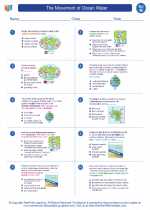
 Worksheet/Answer key
Worksheet/Answer key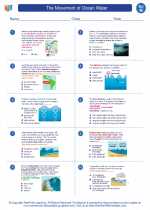
 Worksheet/Answer key
Worksheet/Answer key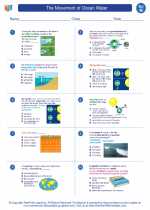
 Vocabulary/Answer key
Vocabulary/Answer key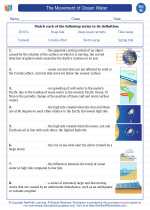
 Vocabulary/Answer key
Vocabulary/Answer key